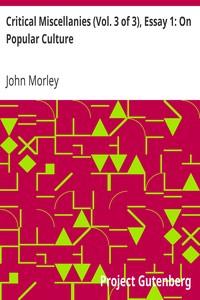Read this ebook for free! No credit card needed, absolutely nothing to pay.
Words: 7609 in 2 pages
This is an ebook sharing website. You can read the uploaded ebooks for free here. No credit cards needed, nothing to pay. If you want to own a digital copy of the ebook, or want to read offline with your favorite ebook-reader, then you can choose to buy and download the ebook.


: Address delivered by Hon. Henry H. Crapo Governor of Michigan before the Central Michigan Agricultural Society at their Sheep-shearing Exhibition held at the Agricultural College Farm on Thursday May 24th 1866 by Crapo Henry Howland - Agriculture Michigan
But I must take leave of this subject.
THE STATE AGRICULTURAL COLLEGE.
Permit me now to occupy your attention for a brief space whilst I speak of this Institution--the State Agricultural College--upon whose grounds we are now assembled, and where by the kindness and courtesy of its officers, we have been so cordially welcomed and so pleasantly entertained. It is not, I think, inappropriate to the occasion that I should do so.
Let me remind you then, in the outset of my remarks on this subject, that this Institution is in its early infancy; and that notwithstanding the beautiful landscape which is spread out before us; with its verdant fields just springing into luxuriance, dotted with the finest specimens of the choicest breeds of sheep and cattle, with the College grounds skillfully laid out and now in process of being tastefully adorned by Art, a few years only have been numbered with the past since not only this spot, but all the surrounding country, as well as almost the entire territory of our young, but noble and now highly prosperous State, was an unbroken wilderness, covered with the primeval forest, the entangled woods giving shelter and concealment to wild and ferocious beasts, as well as to the wandering and savage red man. What a change has thus been wrought in a few short years! the result of the toil and privation of the adventurous pioneers, of whom many have already become intelligent, enterprising and forehanded farmers.
And more than this: Michigan, although but recently settled, and one of the youngest in the great sisterhood of States, has been the first to establish a professional school for the agricultural education of her sons, in which is not only taught the sciences and their application to agriculture, but also agriculture as an art, with such experiments as are calculated to impart a more thorough and practical knowledge of the same; and connected with the study of these a department of manual labor; the legitimate effect of all which is to increase the student's desire for knowledge as well as his love of study, and to remove the barrier too often existing between the educated and laboring classes--which can only be done by giving a better education to those who labor, and by removing the prejudices of the educated against labor.
But I propose to speak more definitely of the aims and objects of this Institution, as well as its claims to the favor and support of the farmers of Michigan. They need not be told, I think, that its design is to promote their benefit. But have the farmers of this State, as a class, heretofore recognized this fact? And have they in return for the advantages which it proposes to them, given it that countenance and encouragement which it claims at their hands? I fear not. There are, it is true, noble exceptions to this; yet it is also true that a large proportion of their number have looked upon it with suspicion and distrust, as though its purpose was to do them a wrong--to inflict upon them an evil. They have not merely withheld from it their aid and support, but their active influence has too often been exerted to its disadvantage and prejudice. This is certainly wrong--very wrong!
Let us look a little into this matter. Is knowledge--a knowledge of those sciences which are intimately connected with agriculture as an art--of no value to the farmer? Is it necessary that he should be a dolt in order to be fitted for his vocation? Will ignorance and bad husbandry increase his crops or enable him to find a better market for his products? Or, will his enjoyment, in his daily round of toil, be any greater because unconscious that he is groping his way along in the dark? No! For however that may have been in the past it is certainly not the case now. And although "ignorance," as it is said, may be "bliss," yet in these days, at least, it must be a sort of negative bliss.
This proposition is so self-evident to intelligent men, that to advance it to such an audience as the one before me--except as the basis of an argument--must be entirely superfluous. But what was the social position of the farmers, let me ask--even in this highly favored country--fifty or sixty years ago? Were they not then regarded as men without knowledge--devoid almost of sensibilities--unfitted for anything except the mere routine of daily labor and toil--and capable only of delving in the soil day by day? And were they not then considered, even by themselves as well as by others, as occupying the very lowest position in the scale of society? Such were the facts. Every person who was regarded as too ignorant and uncultivated for other pursuits, was, by common consent, considered as having a prescriptive right to farming as a vocation. In fact ignorance was regarded as the proper and sufficient diploma for the farmer. And as a consequence he was not only poor and without influence, but too often considered by others as without respectability merely because he was a farmer; and all that was conceded to him--in fact all that he claimed for himself--was a simple subsistence upon the hardest fare, without any of the luxuries, and very often with a scarcity of the necessaries of life.
But although the farmers have emerged from this condition very slowly, yet what is their position now? Are they not regarded as being on a level at least with those of other callings in social importance? Do they not occupy positions of confidence and trust in society? Are they not found in our Legislative Halls in fair proportion with men of different pursuits? This is certainly true: and the advance alone is the result of a higher mental culture--of a wider range of thought--and of an increased fund of knowledge, and consequently of an improved system of farming.
And if the advance of agriculture and the condition of the farmer have been tardy, as compared with the improvement in other departments of labor--in other avocations of life--it is solely because science and study have not as soon been applied to agriculture--and because also the farmer has not been permitted the advantages resulting from so early a development of facts connected with his calling as have other classes of men.
But why have a portion of the farmers of Michigan seemed to look with distrust upon this Institution, and in some cases, I regret to say, seemed to regard it as a sort of wrong to themselves; and if they have not actually opposed, have, at least, withheld from it their support? I must confess, that should I give what seemed to me to be the true answer to these questions, it might be regarded by some who have not very carefully looked into the subject, as an assumption on my part unwarranted by facts.
Would that it were so; that I were mistaken. But having given the subject some little thought and investigation, you will, I trust, permit me the honest expression of my own views upon this important matter. It is for that purpose and none other, that I am here. But you, Mr. President, as well as all those now present, can certainly take no personal exception to these views, as the very fact of such presence shows that you are not of the class to which I may allude; and I am gratified in being able to say that I believe there are very many others, not present, who are the warm and devoted friends of this Institution; and who, with you, I most certainly hope, constitute the rule and not the exception.
Free books android app tbrJar TBR JAR Read Free books online gutenberg
More posts by @FreeBooks

: The Present State of Virginia by Jones Hugh - Indians of North America Virginia Early works to 1800; Slavery Virginia Early works to 1800; African Americans Virginia Early works to 1800; Virginia Description and travel Early works to 1800



: Critical Miscellanies (Vol. 3 of 3) Essay 1: On Popular Culture by Morley John - Literature History and criticism





